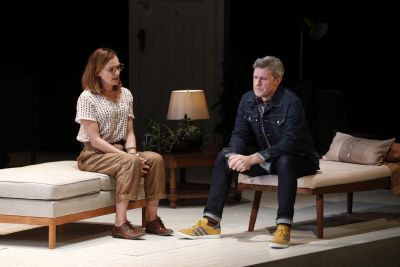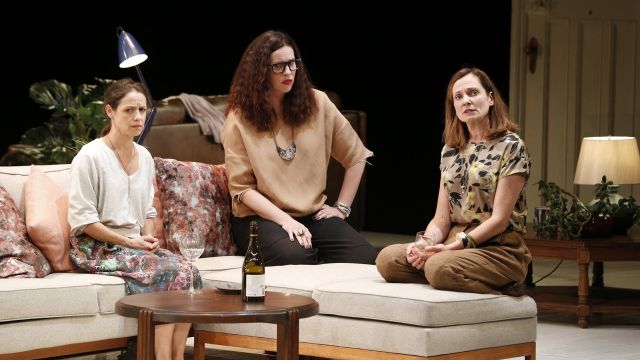Three Little Words
The ‘three little words’ of the title are not, as you might think, those of the popular 1930 song. On the contrary. After twenty years, Tess (Catherine McClements) and Curtis (Peter Houghton) have decided to separate. The ‘three little words’ here are: ‘We’re splitting up.’ And when Tess says those words, it’s not just their best friends Annie (Kate Atkinson) and Bonnie (Katherine Tonkin) who are stunned and incredulous. The audience has a sharp intake of breath and goes very still. A nerve has been touched. In an uncertain world, it seems we invest in whatever certainties are close to home – such as the long-established relationships of our nearest and dearest. Then, out of the blue, that established order collapses. A chasm opens. And then the audience waits… Now what? What next? ‘Marriage’ might be open to debate, but Joanna Murray-Smith is clearly onto something here.
She is a cool and even-handed observer: everyone here gets their moment and their devastation, and no one escapes unscathed. Tess is the initiator of this crisis although even she finds it hard to define exactly what it is that she wants beyond what she doesn’t. Something… something more? The text is especially tough on Tess, (a book editor who can’t spell) but Ms McClements’ vitality and touching vulnerability keep us with the character even when we might want to shake her. Mr Houghton navigates beautifully his character’s (at first unwanted) transformation. His Curtis is initially the stolid nice guy school teacher, politically correct, metrosexual feminist, claiming to support Tess’s liberation, but revealing most believably, as the layers come off, long supressed rage and frustration. Kate Atkinson’s performance as masseuse Annie is – as usual for Ms Atkinson – superbly clear and sweet and no one does confused uncertainty turning into knowledge and understanding better. Katherine Tonkin as the tough-talking gallery owner Bonnie is a knock-out. Her character does get a lot of the best lines, but as the bullying authority figure compensating for her own self-doubt, she is wonderful – a sort of foul-mouthed Eve Arden with very fine comic timing.
 It’s a tribute to this cast and to director Sarah Goodes that there are as many laughs at the characters’ reactions as there are to Ms Murray-Smith’s lines. Ms Goodes’ direction is energetic and physical: she keeps the characters constantly but believably on the move, each in her or his own way, but she also calibrates their transforming realisations seamlessly.
It’s a tribute to this cast and to director Sarah Goodes that there are as many laughs at the characters’ reactions as there are to Ms Murray-Smith’s lines. Ms Goodes’ direction is energetic and physical: she keeps the characters constantly but believably on the move, each in her or his own way, but she also calibrates their transforming realisations seamlessly.
The action all takes place in two – then four – locales: Tess and Curtis’ house, Bonnie and Annie’s house, a theatre foyer and… a third. These locations are all on a revolve, but without partitions and no one leaves the stage. The actors moving props around and Paul Jackson’s light and shadows move us through time and the string of short, sharp scenes. It’s always perfectly clear where we are, aided by Michael Hankin’s design; furniture and other props just right for the characters.
What happens next after those three little words involves a lot more than who gets the spirits tantalus. I don’t think it’s a spoiler to say this is not an amiable separation – although it’s what Tess and Curtis are unthinkingly determined that it be. Their split is a catalyst for a series of emotional explosions – but from ticking time bombs. Alliances shift. Who will take who’s side? The glue of compromise dissolves. Buried enmities are revealed. The hurt and the betrayed go on the attack. Simmering resentments come to the boil. Insults are hurled. And what people really think gets spoken and it gets vicious.
 I’m sure many people in that full house opening night audience recognised these phenomena even while laughing out loud at what was horribly painful and confronting at the time in their lives. Yes, laughing out loud because this is a very funny play, making it far more punchy and effective than a solemn weepie in delivering its truths. (I was reminded, for instance, of Woody Allen’s Husbands & Wives or some plays by Yasmina Reza – although Three Little Words is both more emotional and funnier than the latter.)
I’m sure many people in that full house opening night audience recognised these phenomena even while laughing out loud at what was horribly painful and confronting at the time in their lives. Yes, laughing out loud because this is a very funny play, making it far more punchy and effective than a solemn weepie in delivering its truths. (I was reminded, for instance, of Woody Allen’s Husbands & Wives or some plays by Yasmina Reza – although Three Little Words is both more emotional and funnier than the latter.)
The paradox of this sort of comedy is that it is, on the one hand, more ‘real’ in that people really are illogical, self-serving, cruel, cowardly, compromising and self-destructive. But on the other hand, life isn’t comic: when aggression, barbed insights and sheer nastiness are shot across the barricades – to get a laugh, of course - anyone in ‘real life’ would likely be so devastated they would crumble and run. Here, scenes continue on… and not always with even a riposte.
Three Little Words is no sit-com, although what it explores is essentially a situation – a situation that develops to something as uncertain as the characters. Very occasionally, there is a feel of the wheels spinning, but the laughs – which are constant - help the medicine of insight and pain go down. To turn from Ms Murray-Smith’s gripping psychodrama Switzerland (for Melbourne audiences quite recently) to this farcical domestic comedy demonstrates her impressive range. This play will travel; with some minimal dialogue tweaking it will play wherever the settled world of ‘couples’ is disrupted.
Michael Brindley
PREVIEW AND BUY THE SCRIPT HERE.
Images: (from top) Kate Atkinson, Katherine Tonkin and Catherine McClements; Katherine Tonkin and Kate Atkinson; & Catherine McClements and Peter Houghton. Photographer: Jeff Busby.
Subscribe to our E-Newsletter, buy our latest print edition or find a Performing Arts book at Book Nook.

